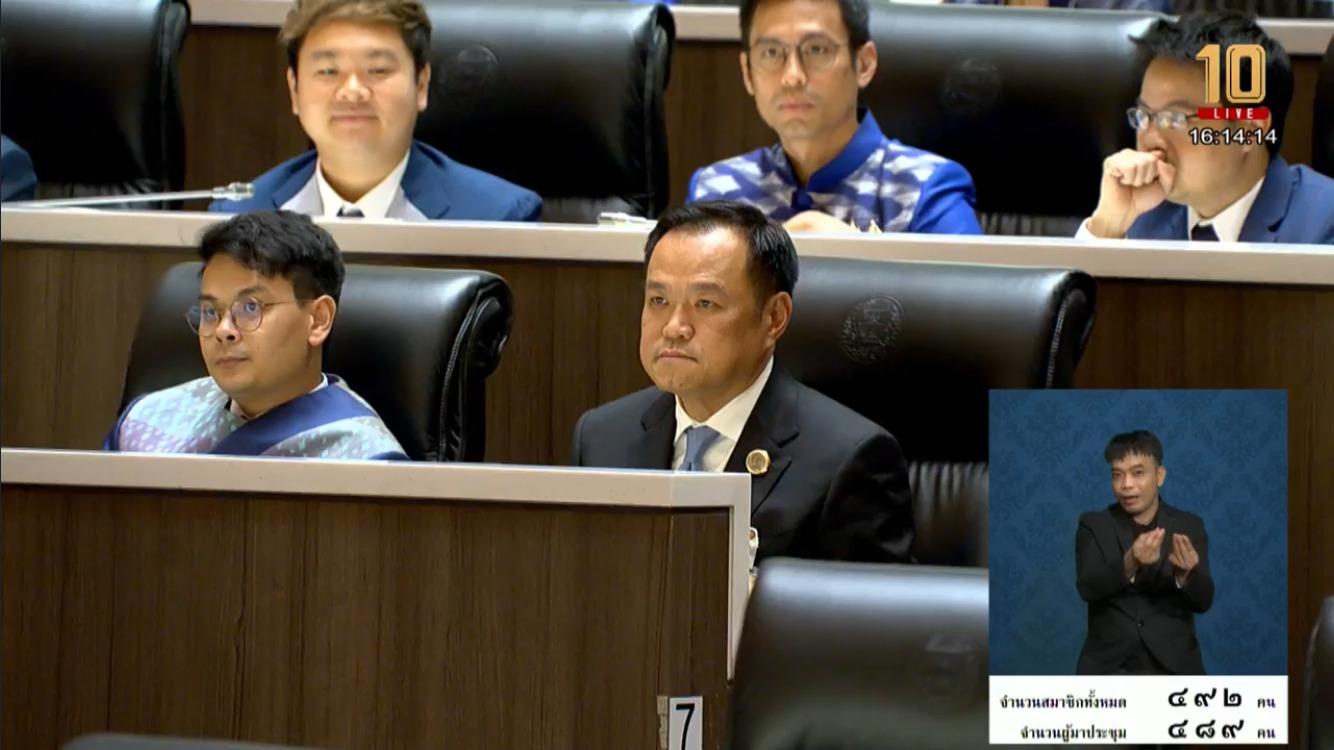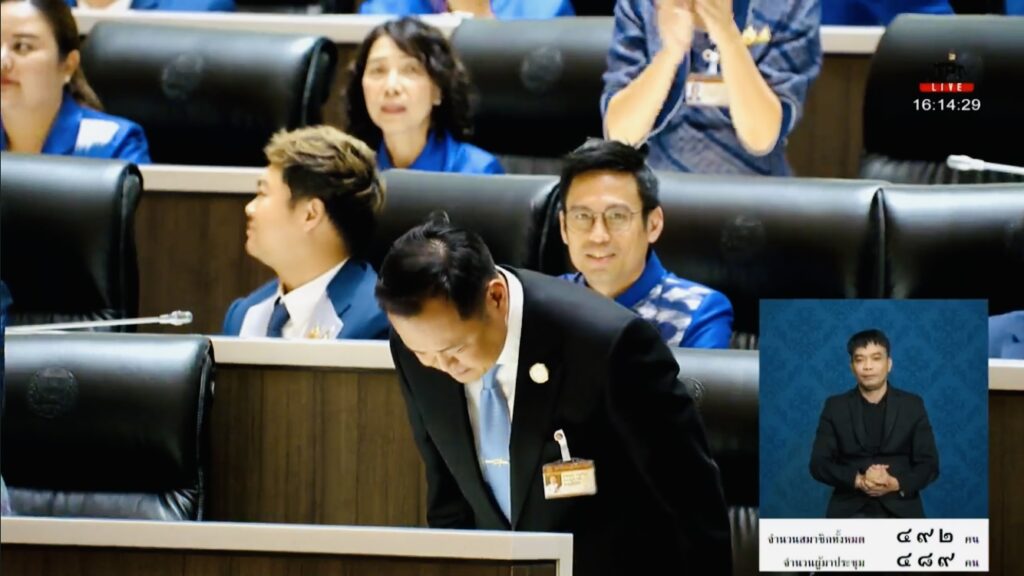Anutin Charnvirakul, Bhumjaithai Party’s coalition-turned-opposition leader, is expected to take office to help address urgent issues, including the current border dispute with Cambodia, as the largest opposition party, People’s Party, sets a timeframe for the new office for four months only, in exchange for the majority votes of its MPs
The House of Representatives has voted to select a new Prime Minister, the 32nd, this afternoon to replace PM Paetongtarn Shinawatra of the ruling coalition party, Pheu Thai Party, after she was dismissed by the Constitutional Court on August 29 for her breach of ethics as addressed in the Constitution following her leaked phone call with Cambodia’s President of Senate and former PM, Hun Sen. (Read: Charter Court dismisses PM Paetongtarn from office following leaked phone call audio with Hun Sen)
311 of 492 MPs have cast their votes to support Mr. Anutin to become the new Prime Minister of the country. The other candidate proposed to compete with him is the last name on Pheu Thai’s PM nomination list, Prof. Chaikasem Nitisiri. He received just 152 votes, while 26 more votes were abstained, and two more MPs were absent from the House’s session.
The agenda was first placed as the 8th and final urgent one on the House’s urgent agenda list, but was then moved up to be the first agenda upon request by some MPs of Bhumjaithai in the morning. The qualifications of the candidates were also subject to a lengthy debate following the proposal made by the coalition MPs. But after spending a few hours debating, Mr. Anutin was voted to become Thailand’s new PM as such.
The voting of a new PM by the House of MPs follows Sections 167, 158, and 159 under the Constitution. Section 167, paragraph 2, states that if the Cabinet is removed under some conditions, including the termination of premiership following Section 170, its new members, along with a new PM, shall be formed under Section 158, 159.
Section 170 (4) states that the status of a “Minister” becomes invalidated when lacking qualifications or possessing prohibited characteristics according to Section 160. This is also applied to a PM.
Section 160 (4) states that a Minister must have demonstrable honesty and integrity, and Section 160 (5) states that a Minister must have no behaviour that seriously violates or fails to comply with ethical standards. The ethical standards under this section are linked to the Court’s ethical standards applied to members of Parliament and the Cabinet following Section 219 of the Constitution.
PM Paetongtarn was dismissed for breaching the ethics addressed under Section 160 (4), (5), resulting in her losing her ministership and premiership status under Section 170 (4). The new Cabinet and new PM, as such, shall be formed following Section 158, 159 accordingly.
Section 158 addresses the appointment of the new Cabinet and PM by the King following procedures taken under Section 159. Section 159 addresses the selection of a new PM with more than half of the votes of the House of MPs.
The House has 492 MPs in total, and a new PM must gain 247 votes onwards.



Shortly after the dismissal of the premiership of PM Paetongtarn on Aug 29, political leaders were fiercely vying for votes in the House, including Mr. Anutin, whose party has turned from a coalition to an opposition as it decided to leave the government coalition led by Pheu Thai shortly after the leaked phone call of PM Paetongtarn on June 18.
He approached the People’s Party, which has 143 votes, for support, while more coalition parties and groups left the Pheu Thai-led coalition to help him form a new government in competition with Pheu Thai hours after the dismissal.
His party of 69 MPs managed to collect votes from a newly formed coalition. Their MP number altogether was reported to be 146 before the voting took place. He gained more votes from the coalition MPs today, reportedly up to 25, increasing his status quo of 289 to 311.
But his government will only be the minority administration, and therefore will be relying on votes from MPs of the People’s Party to push for critical agendas. The two parties have committed to the Memorandum of Agreement (MOA) made between them. Among the conditions set under the MOA is the freeze of the new coalition’s members to maintain its position as the minority government, the end of the terms of this ad-hoc government in the next four months through a House dissolution, and the push for a referendum and major amendment of the 2017 Constitution, seen as problematic to the current politics.
The House’s selection of the new PM as Mr. Anutin has dealt a major blow to the government coalition led by the Pheu Thai Party, as it cannot maintain its coalition and power to run the country.
The Pheu Thai-led coalition of 11 parties earlier possessed 322 MPs, but it lost 69 MPs of Bhumjaithai after the party decided to depart the coalition shortly after PM Paetongtarn’s leaked phone call on June 18. Pheu Thai and Bhumjaithai were also wrangling with each other at that time. The coalition further lost supportive votes shortly after the Court ruled over the case on August 29, as some coalition parties and groups further departed it to back Mr. Anutin instead.
Pheu Thai tried to fight back by approaching the People’s Party, but no confirmation was made to Phue Thai that the party would back it. Pheu Thai then switched to a proposal to propose a House dissolution, seen as playing a political game, but the government’s proposal was returned as the Deputy PM acting on behalf of an absent PM, Phumtham Wechanachai, had no authority to propose it for a royal endorsement.
The political uncertainty has still occurred as a powerful political figure, former PM Thaksin Shinawatra, is away and now in Dubai, claiming he needed to see his doctor. Mr. Thaksin flew to Dubai yesterday evening amid speculation whether he had evaded the Supreme Court’s ruling over his jail term incompletion in “Thaksin’s 14th case”.
The ruling is scheduled for September 9, or next Tuesday. Mr. Thaksin posted on his social media, including X, that he will return and appear in court, whereas nobody is certain what will happen next.
Indie • in-depth online news agency
to “bridge the gap” and “connect the dots” with critical and constructive minds on development and environmental policies in Thailand and the Mekong region; to deliver meaningful messages and create the big picture critical to public understanding and decision-making, thus truly being the public’s critical voice


